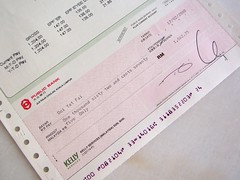What would your future-you have to say to you?
The no-pants guide to spending, saving, and thriving in the real world.
What would your future-you have to say to you?
Three years ago, we sat down and built our budget. We spent 9 months adding the non-monthly bills that we forgot about when we created the budget. Setbacks and shortfalls almost killed the budgeting plan completely. It took almost an entire year to get our budget right.
Unrelated ImageNow? I refer to the budget once per month. No more. I don’t check it at bill-paying time. I don’t think about it daily. It’s there as a reference when I need it, but it no longer drives our finances. How did we get to that point?
First, we firmly established our budget. We know exactly what we need to cover our expenses. None of the predictable bills catch us by surprise any more. This is important.
Once we had the budget established, the rest was easy. I moved almost every bill to US Bank’s online bill-pay system and switched to electronic billing and automatic payments. The automatic payments are all through US Bank. I only allow my mortgage to be set up with the merchant. I want total, instant control over the rest. I won’t call a merchant to ask them to change a payment if something comes up. The bank sends me an email when a payment is automatically scheduled, and again when it is paid.
Once I got comfortable with the automatic payments, I switched to electronic billing. I don’t need to see the bill or waste the paper if I know it is being handled for me which is why I encourage you to manage all your finances online. I do check the few bills that may change, like the credit card and cell phone. Now, I see few of my bills. They are all sent electronically to my bank, automatically paid, and scheduled in Quicken–all without intervention from me.
[ad name=”inlineleft”]We also use an envelope system. I know how much we need for groceries, baby crap, clothes, etc. At the beginning of the month, I take out all of that money in cash and put it into the appropriate envelopes. Other than this money, almost everything else takes care of itself. I don’t need to pay attention to by bills on a day-t0-day basis. Any extra money that comes in gets divided among our debt repayment and savings goals, which only takes a few minutes to arrange.
I glance over my budget at the beginning of every month, but I only review it when something changes. If we change our cell phone, or our budgeted gas bill changes, I make the change to our budget. Other than that, it’s not even an afterthought.
That’s how we do it.
Another option includes the Sloppy Math System. This consists simply of rounding deposits down and rounding expenses up. The more you round, the better the system works. If you round every deposit down $50, and round every expense up to the next $10, you are naturally building more room for error. Given enough time, you will have enough of a slush fund to handle emergencies and the occasional impulse purchase.
First, my disclaimer: I’m not destitute.
However, I’m trying to spend Christmas acting like I am a pauper.
Why, with small children and beautiful-and-more-than-deserving wife, would I want to deprive my family of a bountiful holiday?
Before we get into the reasons for being a horrible grinch bent on depriving my children of their god-given right to rampant consumerism, let’s look at the Philosophy of Destitution.
The primary reason to pull back and tone it down is basic frugality. Excessive anything is not frugal. I am training my children–and for that matter, my wife and my self–in the finer arts of personal responsibility and frugality. Accumulating debt for a fleeting holiday is insane. If we can’t afford to buy it, we certainly can’t afford to give it. Anything else would be setting a bad example and children learn best by example.
Another piece of the Philosophy of Destitution(when I read this word, I hear a deep, booming voice in my head, like a 30s radio superhero voiceover) is “green”. I consider myself a conservationalist rather than an environmentalist, so don’t read too much into that color. I try to be responsible, instead of destructive and I try to avoid being wasteful. Toys that won’t be played with are wasteful. A garbage can full of packaging for those same toys costs money. It is much cheaper to avoid the landfill here.
Back to “Why”. Why would I be willing to deprive my family?

I’m not a huge fan of New Year’s resolutions. Generally speaking, if you don’t have the willpower to do something any other time of the year, you probably won’t grow that willpower just because the last number on the calendar changed.
Seriously, if you’ve got something worth changing, change it right away, don’t wait for a special day.
That said, this is the time of the year that many people choose to try to improve…something. Some people try to lose weight, other people quit shooting meth into their eyeballs, yet others(the ones I’m going to talk about) decide it’s time to get out of debt.
Now most people are going to throw out some huge and worthless goals like:
The problem with goals like that is the definitions. What is “some”, “more”, “better”, or “less”? How do you know when you’ve won.
It’s better to take on smaller goals that have real definitions.
Try these:
But Jason, I hear you saying, where am I going to find $1000 to save? Well, Dear Reader, I’m glad you asked. Next time though, could you ask in a way that others can hear so my wife doesn’t feel the need to call the nice men in the white coats again?
Let’s break that goal down even further.
Instead of saving $1200, let’s call it $100 per month. That’s a bite-sized goal. Some people don’t even have that to spare, so what can they do?
Let’s make that resolution something like “I’m going to have frozen pizza instead of my regular weekly delivery.” If your house is anything like mine, that brings a $60 pizza bill down to $15 for some good frozen pizza for a savings of $45. If you order pizza once a week, that’s $180 saved each month, double your goal. That’s a win with very little suffering.
Now, you can take that extra $80 that you hadn’t even planned for and throw it at your credit cards. That’s a free payment every month. Before you know it, you’ll have your cards paid off and a decent savings account.
Then you can thank me because I made it all possible.

Life is all about trade-offs. You trade your time for a paycheck. Your trade your paycheck for food, rent, and security. Don’t get so obsessed with saving and security that you forget to live your life. There are many good reasons to put your savings on hold in order to really live. Here are five of them:
1. You have an adequate emergency fund. You will never hear me advise against an emergency fund. If you don’t have one, stop reading this and get one. Go. Without an emergency fund, your budget is a financial crisis waiting to happen. With an emergency fund, you can weather life’s speed-bumps without watching them become total train-wrecks.
2. Your retirement is on autopilot. You are not allowed to stop saving and investing for retirement. Ever. Assuming you have a traditionally scheduled career that involves you working until you hit 65 and deferring a huge chunk of living until then, your income will cease when you retire. Do you know how long you will live? Do you want to spend your retirement broke and bored? Are you relying on the responsible financial management of the federal government to make sure you will still get your Social Security? Invest in your retirement and get this investment on autopilot so you can stop worrying about it.
3. Your income is set. I don’t believe in the fairy tale of a company being loyal to its employees. The aren’t. However, if you have a stable-ish job, an in-demand career, and some side-income coming from alternate sources, your emergency fund can be enough to carry you through the low times. That’s what it’s there for.
4. You have dreams. If you’ve always wanted to travel the world, follow a band on your, volunteer extensively, or anything else, it’s time to do it. Don’t postpone your passion.
5. Deathbed regrets suck. Very few people lie on their deathbed lamenting the things they did. Regrets tend to be focused on opportunities missed, skipped, or indefinitely postponed. Do the things that are important to you before it’s too late to do them. Don’t abandon your future in favor of current pleasures, but don’t forget to live, now.
Do you have any other reasons to stop saving?
This guest post is brought to you by Lender411.com.
The debate is ongoing about whether it’s better to rent a home or buy one. Which is best?
To start, identify your goals. This includes short-term goals and long-term goals—anything relevant to your living situation or your finances. Are you someone who likes to move around and explore new areas, or have you put down strong roots in a specific location? Are you planning to raise a family? Is that family going to grow over the years? Do you plan to build up wealth? Are you aiming to retire a few years early? Work these things out as best you can. You need to know where you’re headed.
Beyond these life considerations, there are some specific facts about homeownership that typically make buying a house a better choice than renting one indefinitely. Specifically, you’ll save money in the long run if you buy a house. Studies have shown that if you plan to remain in a residence longer than five years, you’re better off buying than renting. Here’s why.
Equity. When you own a house, every dollar you put toward paying off the principal of your mortgage is actually going right back to your pocket in the long run. A house itself is an investment—it is a thing that holds value and, in fact, often gains value over time. It’s almost like a savings account. When you put money into a savings account, it stays there. Sure, you don’t exactly have access to the money, but it’s still there and, in the long run, it’s still yours. You don’t gain this value when you’re renting a piece of property. The money you pay out is simply gone.
Value. As mentioned above, a house, like any other financial instrument or investment, can actually increase in value over time without any effort on your part. Sometime property values just go up. Historically, in fact, just about all property gains value in the long run—often significant value. Real estate is a very popular form of investment even separate from the fact that it provides your family with a place to live. Even with a mortgage, the ultimate return you can get for your money is typically very good, especially if you’re able to find the best mortgage rates when you enter the loan. Renting doesn’t give you this opportunity to someday capture increasing property value.
Stability. One of the most appealing perks of home ownership is the consistency of payments month to month. If you have a fixed rate mortgage, your monthly payment is locked in at a certain amount for the next thirty years or so. This can be extremely comforting for some people and extremely helpful when it comes to budgeting long-term. When renting, prices may fluctuate from lease to lease, or you may move from one place to another and constantly have to readjust your budget and lifestyle. Also, mortgage payments on a house will, at some point, end. When those thirty years are up, chances are you won’t need to make any payments toward your house beyond property taxes from then on. Renting, however, never ends. You’ll never truly have a place of your own.
Despite the strength of these three facts in favor of home ownership over renting, the choice is ultimately one that must be made by individuals and families. Everyone has different long-term goals, and those goals must be identified first. But make the decision wisely. From a financial perspective, home ownership is the better of the two options long-term.
Update: I just realized I didn’t include the link to the Festival of Frugality that included this post. That’s fixed.